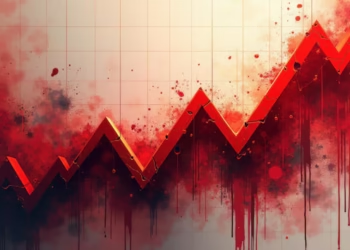The Ghana Stock Exchange (GSE) witnessed a mixed performance in its latest trading session, as the benchmark GSE Composite Index (GSE-CI) recorded a decline, while the GSE Financial Stocks Index (GSE-FSI) showed resilience with a notable gain.
The session saw significant declines in trading volume and turnover, but a few equities posted impressive gains, led by Clydestone Ghana.
The GSE Composite Index, which measures the overall performance of the stock market, fell by 62.32 points (-1.02%), closing at 6,063.76 points. This represents a 1-week loss of 1.48%, reversing some of the recent gains.
However, over a four-week period, the index remains positive, showing an 8.31% gain, while its year-to-date (YTD) return stands at 24.04%. Despite the single-day drop, the market remains in a strong position compared to the start of the year, reflecting overall investor confidence in Ghanaian equities.
The decline In the composite index was largely influenced by the performance of MTN Ghana, which lost 2.24% in value. As the most actively traded stock, MTN Ghana’s price movement often has a significant impact on the broader market index.
Financial Stocks Continue to Gain Ground
On the other hand, the GSE Financial Stocks Index (GSE-FSI) performed better, increasing by 0.57% to close at 3,053.11 points. This represents a 1-week gain of 0.79%, a 4-week gain of 10.59%, and a YTD return of 28.24%.
The strong performance of financial stocks highlights sustained investor interest in Ghana’s banking and financial services sector, which has demonstrated resilience amid economic fluctuations.
The impressive performance of financial stocks was supported by Access Bank Ghana, which saw a 9.67% increase in share price, and Enterprise Group, which posted a 3.24% gain. These movements contributed positively to the sector’s overall strength.
Sharp Decline in Trading Volume and Turnover
Trading activity on the GSE witnessed a sharp decline compared to the previous session. A total of 479,987 shares were traded, amounting to a market value of GHS 1,738,926.35. This represents a 92% decline in volume and a 96% decline in turnover compared to the previous trading day (Monday, March 24).
Such a significant drop in trading activity could be attributed to several factors, including profit-taking by investors after recent gains or a cautious approach as market participants assess economic and regulatory developments.
Despite the decline in overall trading volume, certain stocks saw notable trading activity. MTN Ghana recorded the highest volume of traded shares, with 357,856 shares changing hands. Other actively traded stocks included CalBank (52,591 shares), Ecobank Transnational (41,811 shares), and Clydestone Ghana (20,000 shares).
Top Gainers and Losers
Out of the 15 equities that participated in trading, four stocks recorded gains, while only one stock posted a decline.
Clydestone Ghana emerged as the biggest gainer, with a 20% increase in share price, closing at GHS 0.06 per share. Access Bank Ghana followed closely, recording a 9.67% gain.
Enterprise Group continued its positive run, posting a 3.24% increase. NewGold ETF also edged up by 0.36%.
The only stock that lost value on the day was MTN Ghana, which declined by 2.24%.
MTN Ghana’s drop weighed heavily on the GSE Composite Index, given its significant market capitalization and influence in the telecommunications sector.
Despite the mixed performance of the indices, the overall market capitalization of the Ghana Stock Exchange remains strong at GHS 135.1 billion. This underscores the resilience of the exchange, even in the face of short-term market fluctuations.
Outlook for the Market
The performance of the GSE continues to reflect the broader economic conditions and investor sentiment in Ghana. While the GSE Composite Index’s decline suggests a brief cooling-off period after recent gains, the financial stocks’ positive performance indicates sustained confidence in banking and insurance firms.
Investors will be closely monitoring corporate earnings, macroeconomic trends, and regulatory developments in the coming weeks. The recent volatility in trading volume and turnover suggests that market participants are being cautious, possibly waiting for new catalysts before making significant moves.
As the year-to-date gains remain solid, the market is still positioned for growth, especially if key sectors such as banking, telecommunications, and manufacturing continue to show strength.
With market capitalization still at a robust GHS 135.1 billion, the GSE remains a key investment hub. Moving forward, investors will be watching key economic indicators and corporate performances to gauge the next direction of the market.
READ ALSO: President Swears in New DACF Administrator, Pledges Strengthened Local Governance























